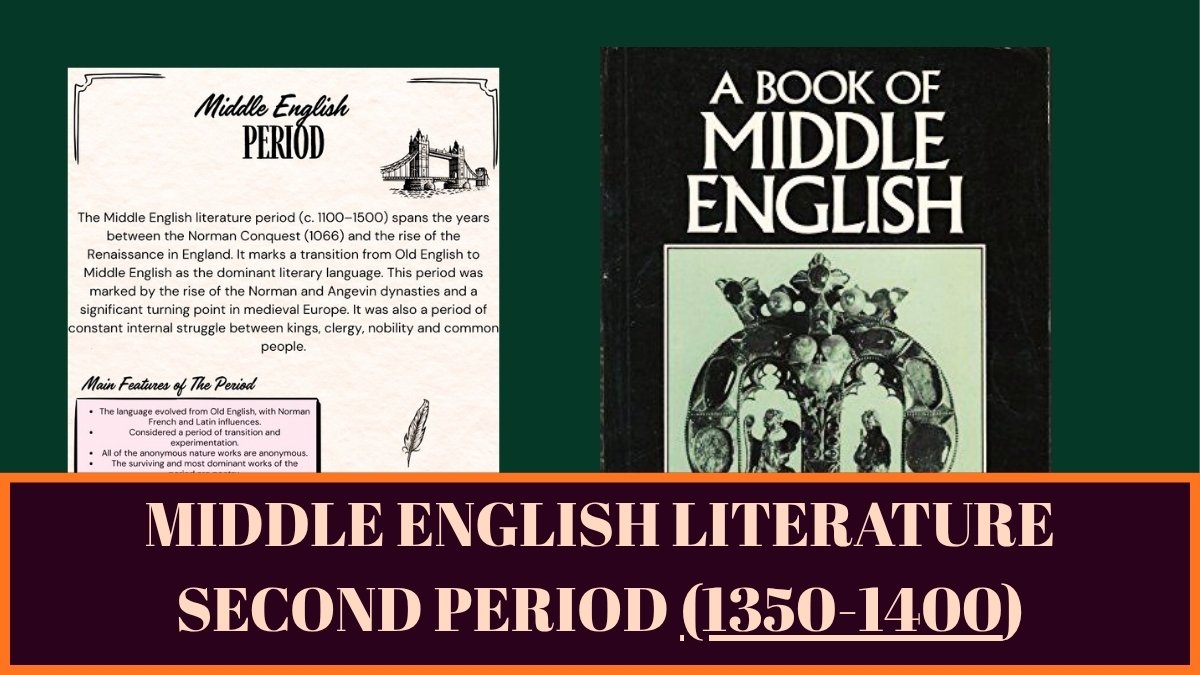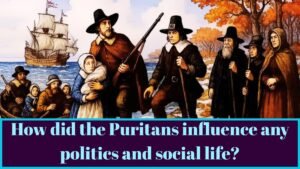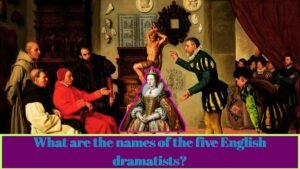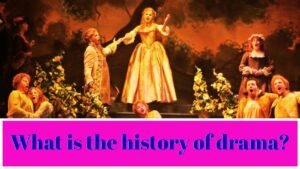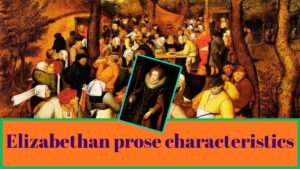MIDDLE ENGLISH LITERATURE SECOND PERIOD (1350-1400)
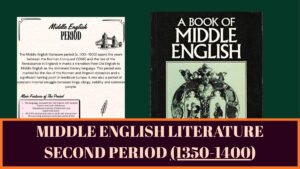
MIDDLE ENGLISH LITERATURE SECOND PERIOD (1350-1400):Langland: Piers Plowman-Gower, Confession of a Madman Historical Background. In order to appreciate the work of Chaucer and his contemporaries in its proper perspective it is necessary to recall to our minds the chief historical persons and events of their times. Chaucer lived through the reigns of two kings, Edward III and Richard II and saw the beginning of a third, that of Henry IV. His age presents a glaring contrast between its earlier and later years. At the time of his birth the Hundred Years’ War had already begun and as a boy he must have heard of the victories of Edward III and the Black Prince. A still greater victory was won at home a little later when English became the language of the law courts and of Parliament. The victories of Crecy and Poitiers roused a new spirit of national unity and pride but produced little literature except a few patriotic songs. All the great works of this period were produced during the later and troubled years which followed upon the death of Edward III. The reign of Richard II was one of the worst that England nas ever known. He was incompetent, capricious and extravagant. The great plague or Black Death had devastated the land, and labour shortage, low wages, and high taxation to meet the cost of the French wars had greatly increased the misery of the masses. poll-tax levied by Richard II led directly to the Peasants’ Revolt or Wat Tyler’s Rebellion which was put down with a heavy hand. To the social and political troubles of the times were added religious troubles caused by a corrupt Church. The bishops who had amassed great wealth lived a life of ease and luxury, the lower clergy were ignorant and indolent, and even the friars who had done good work in the beginning had become notoriously greedy and corrupt. This general corruption in the Church roused John Wycliff to a fury of reform through his pamphlets and preachers. His followers came to be known as Lollards and their movement Lollardy. The moveinent caused many uprisings but they were all mercilessly suppressed. Lollardy went underground and the Reformation in England was delayed by 150 years. John Wycliff the morning star of the Reformation’ had, however, done his work, not only by his crusade against the corruption of the Church, but by translating the Gospels into English, the first translation to appear in any modern The
language. Curiously enough it was during this troubled and unhappy period that English poetry entered upon its first blossoming season. The two races had become almost one and inspite of many-sided social unrest there was a general feeling of national independence and pride. This new-born spirit found expression not only in satire, denunciation and lamentations, but also in the joy of lite.
The three poets of this period are Chaucer, Langland, and Gower. As Chaucer is much the greatest of the three and needs a more detailed consideration, let us first dispose of the other two.
WILLIAM LANGLAND
William Langland, the traditional author of Piers’ Plowman is the last great poet to write in the Anglo-Saxon alliterative verse. This revival of an obsolete technique late in the fourteenth century is an unsolved mystery. The author himself also remains a mystery, for little definite is known about him. From evidence both external and internal the personality of the author built up by scholars is as follows: He was born about 1332 in the Western part of England near the Malvern hills. Educated in a monastery school, and having failed as a churchman in minor orders, he shifted to London. Here he made his living as a beggar singing psalıms for the souls of the dead. Here he wrote his poem.
The Vision of William Concerning Piers the Plowman is a huge poem of alliterative verse divided into a large number of a passus’ or Cantos. Prof. Skeat distinguishes three main versions: A, B and C. Texts B and C appear to represent later alterations or revisions at different times. The first version is believed to have been written about 1362, the second about 1377 and the third about 1398. The Prologue describes how on a May morning the poet fell asleep by the side of a brook on the Malvern hills and saw in a vision or dream ‘a fair field full of folk’. It is a bustling scene crowded with people of all sorts, honest as well as dishonest-ploughmen, merchants and minstrels, pilgrims, hermits, friars, palmers, pardoners and churchmen.
The Cantos then develop the allegory. A lovely lady, the Holy Church, appears and tells the dreamer to seek the Truth (God). On his asking what is Truth, she tells him it is Love. Two other characters are then introduced, Falsehood and lady Meed. (Meed Reward in bad sense, Bribery). A marriage between the two is proposed but is opposed by Theology. They then proceed to London to obtain the King’s verdict. On the king’s threatening them with punishment, Falsehood and company run away. Lady Meed confesses her sins to a friar and is promised salvation if she presents new windows to the friars’ convent. This cheap method of winning salvation is then denounced by the author. The king then proposes to marry Meed to his knight, Conscience, but Con-science objects and denounces the lady. So Reason is called and after a long argument in which Wit, Wisdom and Wrong take part, he decides that no mercy should be shown to Wrong (Wrong-doer) and that every good deed should be rewarded. The king is is so pleased with Reason that he decides to keep him always as his councellor. At this point the scene changes to the field of folk and Reason asks them to seek saint Truth and not Saint James or other saints at Rome. Then follows the repentance of the crowd and the confession of Seven Deadly Sins so common in medieval litera-ture. The sins are Pride, Luxury, Envy, Wrath, Avarice, Gluttony and Sloth. The confession of the Glutton is the most brilliant and dramatic. On his way to the church he is tempted by a brewer-woman to drink and he gets so drunk as to wake up two days later.
The repentant crowd decide to start on their pilgrimage in search of Truth, but no one knows the way. At this point appears Piers Plowman after whom the poem is named. He promises to lead the company after he has ploughed his half acre of land. He asks everybody to work hard at his job, and those who refuse or shirk are made to work by hunger. As they are about to start on the journey, Piers receives from truth the Pope’s pardon covering not only Piers and his heirs but all who helped Piers ploughing and sowing. A priest who reads the paper finds no pardon but only the simple statement that those who do good will get salvation and those who do evil will be damned. The poem in its first version ends here with the poet’s passionate plea that only good works can obtain salvation and not pardons and indulgences.
The rest of the poem comprising the second and third versions is the sequel to the first and contains the triple vision of Dowel (Do-well), Dobet (Do-better) and Dobest (Do-best). It is, however, too complicated, and chaotic to be reduced to a coherent summary, The author does not succeed in his second or third attempt to round off his religious or moral lesson. The general impression is that the author was in search of good life, of salvation, of God. At the end Mercy is shown as triumphant over strict justice.
Criticism. Some critics have bestowed high praise on Piers Plowman, and so far as the matter of the poem is concerned, the praise is justified. It is a frankly didactic poem concerned with religious reform. Roused by the degenerate Christians of his times Langland lashes out against the vices of the clergy, especially, their gluttony, sloth and avarice. He attacks social and political iniqui-ties too, and because his hero is a ploughman, some have called him a rebel or revolutionary. But his aim was not to destroy society but to improve and purify its moral life. He idolised Piers the ploughman, because he comes nearest to the ideal of a Christian, Christ having identified himself with the poor and the humble. The poem has vigour, intensity, and sincerity, and because the author spoke for the people, it became immediately popular and continued to be so till the sixteenth century.
So far as the literary merit of the poem is cencerned, it cannot be placed very high. For one thing, the author’s handling of the device of the dream allegory is clumsy. It is not one dream or vision, but a number of visions confusedly following one another. The poem is not a harmonious whole, and it is difficult to follow the rambling and tortuous course of the plot, if it can be called a plot. For another, it has little or no music except in the opening lines and in a few other places. On the whole the poem has little attraction for the modern reader except a few lively descriptions and dialogues.
Its piety is narrow and puritanical and doesn’t appeal to cultured readers of today.
GOWER (1332-1408)
Gower, a court poet like Chaucer was both his friend and rival. Chaucer in his dedication of Troilus and Cressid to Gower calls him ‘moral Gower’, a title that has stuck to him ever since. He was a typical poet of the time who wrote in three languages: French, Latin, and English. His French works consist of some fifty ballades or love songs and one huge poem Speculum Meditantis, a long sermon in verse on the immorality of the age. His Latin work Vox Clamantis is concerned with Wat Tyler’s Rebellion of 1381. As he was a landlord of Kent, the country in which the rebellion had broken out, he was frightened. Having a vested interest, he voiced in this poem his own fears of the nightmarish uprising. Though not in sympathy with the popular cause, he vehemently denounces the social evils which had led to popular disaffection. The poem ends with an appeal to the high and mighty to mend their ways and to listen to the voice of the people, which is the voice of God.
His English work, Confessio Amentis, is an enormous poem of 14000 octosyllabic lines. He says he wrote this at the instance of King Richard who had complained that nobody wrote in the English tongue. The subject is Love, not because it is to the poet’s taste he would much rather write a moral book-but because the people preferred amusement to wisdom.
For thilke cause, if that ye rede, I wolde go the middel wey And write a boke beiwene the twey Somwhat of lust (love, pleasure), somwhat of lore (learning, wisdom).
The poet approaches Venus, the goddess of love, who asks him to make his confession to her priest, Genius-a personage borrowed from Romant de la Rose. Before hearing the confession Genius tells him stories to illustrate the seven deadly sins and their subdivisions so that the poet may know if he is guilty and confess accordingly. After the confession, the poet is mocked and dismissed by Venus as being too old for love. He is advised to stick to morality which he has pursued so long.
The stories drawn from classical and medieval sources are curious and interesting and some of them were borrowed by Chaucer. But their connection with morals drawn from them is absurd. Gower shows power and fluency of narration, but is too long-winded and hopelessly dull. The fact is that though he had enough learning and was not lacking in grace, he was too puritanical to write successfully of love. He lacked vivacity, charm, humour-qualities which Chaucer possessed in an eminent degree and which he himself admits in his rival when he makes Venus adopt Chaucer as her true devotee:
Of dites (ditties) and songes glad The which he for my sake made The land fulfilled is over al. He should have been content with being ‘moral Gower’.
